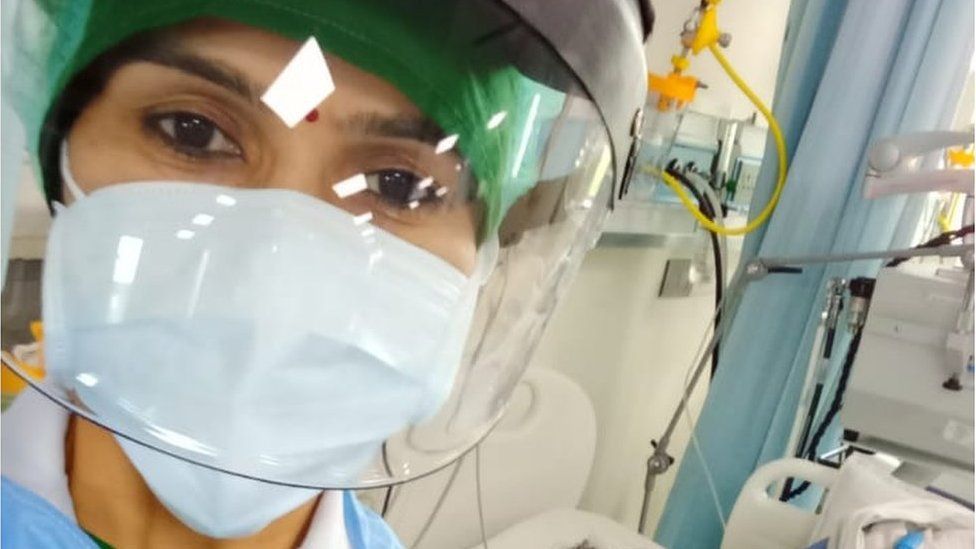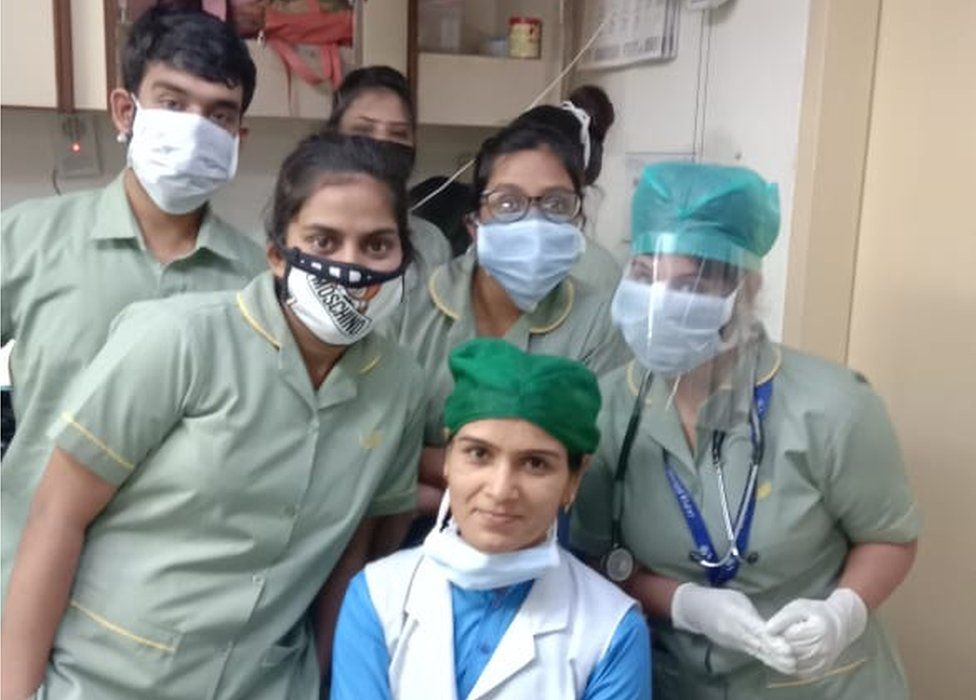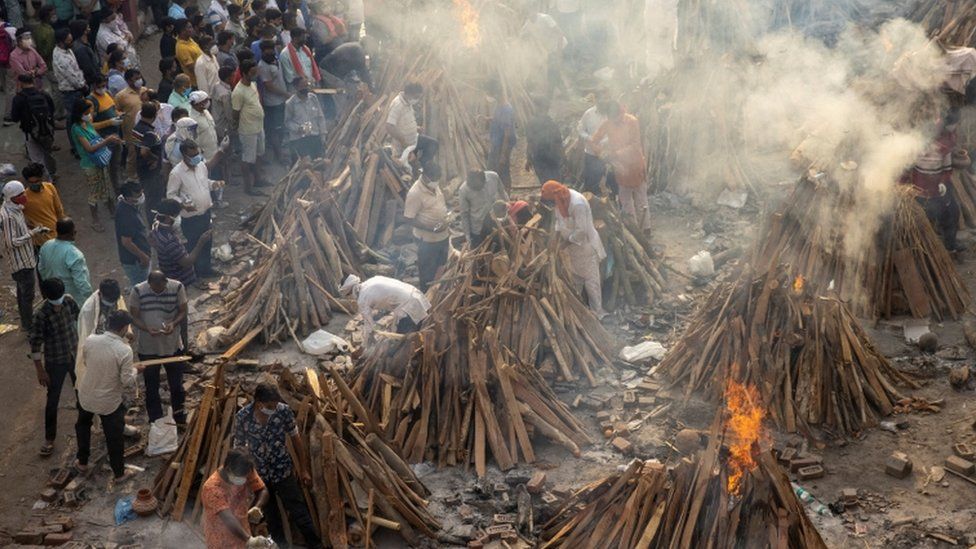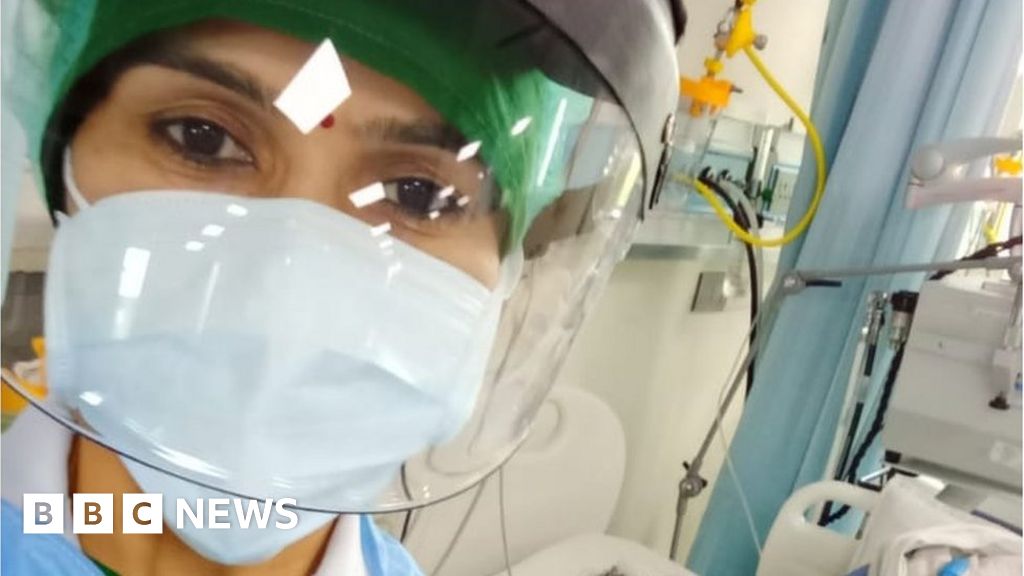
image copyrightViveki Kapoor
A deadly second coronavirus wave is sweeping India, pushing the death toll to more than 200,000. Medical staff are at the forefront of the battle against Covid-19, dealing with death and devastation on a daily basis. In this first-person account, nurse Viveki Kapoor tells the BBC how the virus has changed her life – and her small victories and defeats.
I’m the nurse in-charge at the intensive care unit (ICU) of the Covid ward in a private Delhi hospital and I supervise the work of 25 nurses. Since the pandemic began, many staff quit, they said our salaries were so low and not worth the risk.
The second wave has brought a flood of patients. Like all other Delhi hospital, ours also had to turn away so many after we filled up.
Our workload has gone up five times. All the nurses are now putting in extra hours of work. We always come on time, but we are never able to leave on time.
I’ve been a nurse for 22 years and worked in the past during disasters which would bring an influx of patients to emergency, but what is unfolding now is unprecedented. Now I’m so tired at the end of the day, that I can fall sleep anywhere. I don’t even need a bed anymore.
Nursing is described as the noblest profession in the world and we are called ‘sister’ for a reason. Our patients think of us as family.
Whenever a new patient is admitted to hospital, a nurse is the first person they meet and they form a special bond with us.
The patients who are coming in infected with Covid are very afraid, so we try and motivate them.
I tell them the story of the lion and the deer. I tell them that a deer runs faster, but the lion is still able to catch it because it stumbles when it’s afraid. So, I tell my patients that you must think positive, if you think negative, the virus will win.

image copyrightViveki Kapoor
Earlier, sometimes patients would complain that they called for a nurse and she didn’t attend to them immediately, but now they are being very cooperative.
They can see we are working very hard. Sometimes, they even ask us if we have had lunch or tell us to go drink some water or tea.
In the first wave, we received a lot of older people, but now it’s really sad to see people as young as 15 or 17 coming in with the infection.
We try our best, we try to save a patient until there’s one breath left in him or her.
I feel very happy when a patient recovers, I feel I’m able to help people and that all my hard work has paid off.
But when a patient dies, I feel crushed. I’m especially tormented by the death of the young people, it breaks my heart each time one of them dies.
Recently, my daughter’s friend’s father died. He was a young man. I felt heartbroken, but what could I do except console his family?
Last week, 25 patients died in my hospital after oxygen pressure dropped. I felt so helpless and angry.
I always used to take pride in being an Indian, but it breaks my heart to see what’s happening in the country and I blame our leaders for it. All they care about is winning elections.

image copyrightReuters
Covid-19 has not just turned my job into a time of nonstop tension, it has also made my home life very stressful.
My husband, a doctor in a government hospital, has been sick for the past fortnight so I’m managing work and home all alone, doing all the chores, looking after our three children.
In between, I was very worried because my 90-year-old mother, who lives in the town of Mathura, tested positive. My mother was admitted to a hospital there and put on ventilator.
But she’s recovered and is now back home. Imagine a 90-year-old beating the deadly virus? I put it down to god giving me a refund for all my good work and the blessings of my patients.
It’s the love of my family and my neighbours that keeps me going. They say they worry about me, but they also understand that what we are doing is important. They say: “We are so scared of catching the coronavirus that we have stopped stepping out of our homes, but you go out every day to meet it.”
A neighbour recently told me that earlier she used to light one clay lamp every day at dusk to pray for the long life of her family. Since the outbreak of the virus, she tells me, she lights an extra lamp for my wellbeing. And that makes my job, and life, worthwhile.
As told to the BBC’s Geeta Pandey in Delhi





